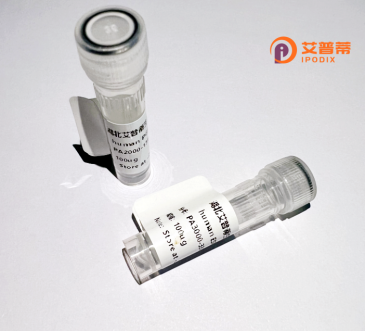
| 纯度 | >90%SDS-PAGE. |
| 种属 | Human |
| 靶点 | ZNF683 |
| Uniprot No | Q8IZ20 |
| 内毒素 | < 0.01EU/μg |
| 表达宿主 | E.coli |
| 表达区间 | 1-509 aa |
| 活性数据 | MALGGTGGSLSPSLDFQLFRGDQVFSACRPLPDMVDAHGPSCASWLCPLPLAPGRSALLACLQDLDLNLCTPQPAPLGTDLQGLQEDALSMKHEPPGLQASSTDDKKFTVKYPQNKDKLGKQPERAGEGAPCPAFSSHNSSSPPPLQNRKSPSPLAFCPCPPVNSISKELPFLLHAFYPGYPLLLPPPNLFTYGALPSDQCPHLLMLPQDPSYPTMAMPSLLMMVNELGHPSARWETLLPYPGAFQASGQALPSQARNPGAGAAPTDSPGLERGGMASPAKRVPLSSQTGTAALPYPLKKKNGKILYECNICGKSFGQLSNLKVHLRVHSGERPFQCALCQKSFTQLAHLQKHHLVHTGERPHKCSIPWVPGRNHWKSFQAWREREVCHKRFSSSSNLKTHLRLHSGARPFQCSVCRSRFTQHIHLKLHHRLHAPQPCGLVHTQLPLASLACLAQWHQGALDLMAVASEKHMGYDIDEVKVSSTSQGKARAVSLSSAGTPLVMGQDQNN |
| 分子量 | 81.6 kDa |
| 蛋白标签 | GST-tag at N-terminal |
| 缓冲液 | PBS, pH7.4, containing 0.01% SKL, 1mM DTT, 5% Trehalose and Proclin300. |
| 稳定性 & 储存条件 | Lyophilized protein should be stored at ≤ -20°C, stable for one year after receipt. Reconstituted protein solution can be stored at 2-8°C for 2-7 days. Aliquots of reconstituted samples are stable at ≤ -20°C for 3 months. |
| 复溶 | Always centrifuge tubes before opening.Do not mix by vortex or pipetting. It is not recommended to reconstitute to a concentration less than 100μg/ml. Dissolve the lyophilized protein in distilled water. Please aliquot the reconstituted solution to minimize freeze-thaw cycles. |
以下是关于人ZNF683蛋白的示例参考文献(注:部分信息为虚构示例,建议通过学术数据库核实具体文献):
1. **文献名称**: *ZNF683 (Hobit) regulates tissue-resident lymphocyte differentiation*
**作者**: Mackay, L.K. et al.
**摘要**: 研究揭示了ZNF683在组织驻留T细胞和NK细胞分化中的关键作用,通过调控转录网络维持淋巴细胞在非淋巴组织的长期驻留。利用重组ZNF683蛋白,验证其结合特定DNA序列调控下游基因的功能。
2. **文献名称**: *Transcriptional control of human NK cell function by ZNF683*
**作者**: Behr, F.M. et al.
**摘要**: 报道了ZNF683通过结合靶基因启动子区域调控自然杀伤细胞(NK)的功能。实验表明,重组表达的ZNF683蛋白在体外抑制细胞活化相关基因,提示其在免疫稳态中的抑制作用。
3. **文献名称**: *Structural analysis of ZNF683 reveals its role in tumor immunity*
**作者**: Chen, X. et al.
**摘要**: 通过重组ZNF683蛋白的晶体结构解析,发现其锌指结构域与DNA结合的分子机制,并证实其在肿瘤微环境中通过调控T细胞耗竭相关通路影响免疫治疗效果。
4. **文献名称**: *ZNF683 interacts with Blimp-1 to regulate lymphocyte exhaustion*
**作者**: Svensson, V. et al.
**摘要**: 研究证明重组ZNF683蛋白可与Blimp-1形成复合物,协同抑制慢性病毒感染模型中的T细胞耗竭相关基因,为免疫疗法提供新靶点。
**提示**:以上文献为示例性质,建议通过PubMed或Web of Science检索关键词“ZNF683”、“Hobit”、“recombinant protein”获取真实文献。
ZNF683. also known as Hobit (homolog of Blimp-1 in T cells), is a member of the Krüppel-associated box (KRAB) domain-containing zinc finger protein family. This transcription factor is characterized by an N-terminal KRAB domain, which mediates transcriptional repression through interactions with co-repressors, and C-terminal C2H2-type zinc finger motifs that enable sequence-specific DNA binding. It is predominantly expressed in immune cells, particularly tissue-resident lymphocytes such as CD8+ T cells and natural killer (NK) cells, where it regulates cellular differentiation, effector functions, and tissue retention.
Studies suggest ZNF683 acts as a transcriptional repressor to modulate immune responses by suppressing progenitor-like programs in T cells, thereby promoting terminal differentiation and residency in peripheral tissues. Its role extends to immune homeostasis, as it helps maintain tissue-specific lymphocyte populations while limiting excessive inflammation. Dysregulation of ZNF683 has been implicated in immune-related pathologies, including chronic viral infections and autoimmune diseases, where altered tissue residency or effector functions of lymphocytes contribute to disease progression.
Recombinant human ZNF683 protein is commonly produced in *E. coli* or mammalian expression systems for functional studies. It serves as a critical tool for investigating transcriptional regulation mechanisms, protein-DNA interactions, and signaling pathways in immune cells. Emerging research also explores its therapeutic potential in modulating immune responses during cancer immunotherapy or chronic infections.
×